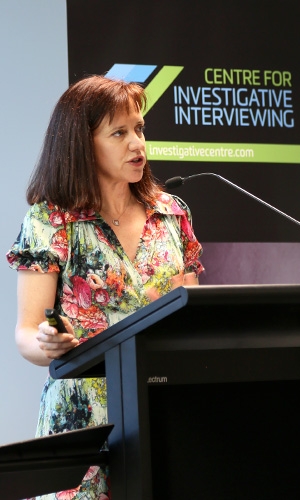Centre for Investigative Interviewing launched
Research news
Representatives from over six jurisdictions, 19 organisations and 11 disciplines - including lawyers, social workers, psychologists and police - gathered recently to attend the launch of Deakin’s new Centre for Investigative Interviewing.
Held at Deakin’s Melbourne City Centre, the launch marked the culmination of over 20 years of dedication to the field by Centre Director Professor Martine Powell, who has become a world expert in investigative interviewing – and has developed a team of international experts who combine the intellectual rigour and practical assistance needed to support the diverse professions that use investigative interviewing.
At the launch, Deakin’s Deputy Vice-Chancellor (Research) Professor Lee Astheimer, said that the Centre was spearheading “transformative translational research that can be adapted to any jurisdiction, across an ever-widening array of professions, including medicine, policing, child protection and family law.”
“It is a very important discipline that can make a fundamental difference to people’s lives, whether these be victims of crime, vulnerable children or adults, or people with a serious illness,” Professor Astheimer said.
Involving the elicitation of an accurate and detailed account from a person, investigative interviewing is used in a range of situations to assist in decision-making by professionals. For instance, interviews of victims often form a critical component of police investigations in cases such as sexual abuse, where there may be no witnesses or physical evidence and the outcome of the case depends on the victim’s verbal account of what happened.
Through broad collaboration and years of extensive research, Professor Powell and her team have developed a training paradigm that is based on the psychology of human learning and uses a vast array of practical resources that are delivered via an online portal. Trainees experience simulated interviews using animated or actual actors, watch short films, take part in interactive quizzes, receive expert feedback, and gain the skills necessary to evaluate their own progress.
In her formal address, Professor Powell said that the launch marked a “special moment in a long journey” that had seen fundamental change in training methods over the past two decades.
“Investigative interviewing is an incredibly complex skill to master. It is not intuitive. It is not easily learned on the job. It is not an art form.
"Rather, it evolves from scientific enquiry – from the systematic study of human behaviour; the evaluation of new improved methods, laws and systems, against agreed outcomes; and the establishment of mechanisms to transmit new knowledge and promote change in practice and procedure,” she said.
“Our journey has been about closing the gap between actual and recommended practice.”
Professor Powell explained that the journey to improve training outcomes involved addressing three main areas: recognising that people learn at their own pace and need immediate and individualised expert feedback; removing the limitations of training within organisational and jurisdictional isolation; and developing a cross-disciplinary approach that reflects the role of the diverse disciplines involved in investigative interviewing.
“The solution was to move out of the classroom; break down the silos; move into the workplace; and make world-class learning resources accessible to in-house trainers through embracing e-learning technology,” she said.
There can be no doubt that her approach was correct. New programs designed by Professor Powell and her colleagues – and piloted with child protection and police authorities in Western Australia and the Northern Territory – have proved a stunning success.
“After 18 months, the results are in. I can say that I have never seen anything as good as this,” said Professor Powell.
“We are getting consistent results and sustained adherence to the (best practice) open ended questioning technique. There was no drop-off in performance six months post-course completion; the length of interviews nearly halved and there was no loss of evidential details.
“We have found a way to assure victims a consistent service at the forefront of developments in the field and we have done so without increasing the burden on tax payers.”
With such success, a bright future for the Centre seems assured. Collaborations are already under way across Australasia in the area of vulnerable witness interviewing, and new partnerships will see its programs delivered across Canada and Chile.
The Centre is also expanding across disciplines, with Professor Powell currently assisting a UK team to develop an e-learning package on the detection of deception in border security and fraud.
Programs in new areas, such as medical communication and interviewing of children in the family law, educational and health settings, are also being developed.
To learn more, visit the Centre for Investigative Interviewing.
Share this story
 Director of the Centre for Investigative Interviewing, Professor Martine Powell.
Director of the Centre for Investigative Interviewing, Professor Martine Powell.
